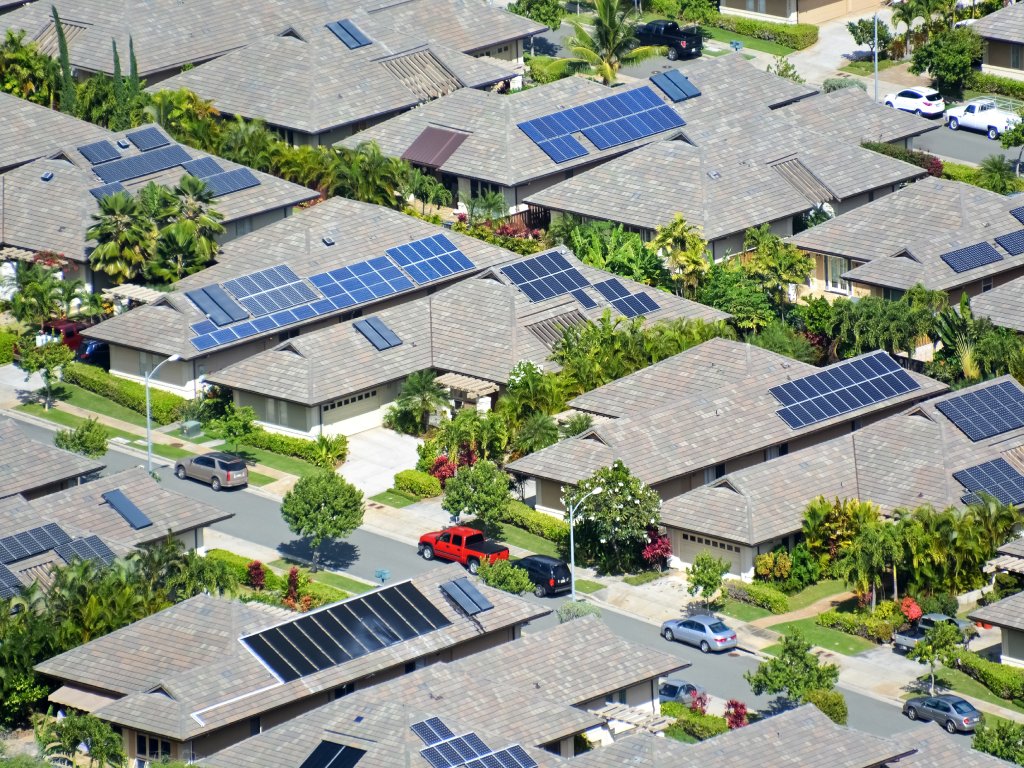 It was registered that during the first nine months of 2021, the United States installed record levels of solar power, capable of producing 5.7 gigawatt-hours of electricity. These installations comprise both residential (behind-the-meter) and in-front-of-the-meter installations. The latter refers to solar energy installations undertaken by power companies to produce electricity for sale.
It was registered that during the first nine months of 2021, the United States installed record levels of solar power, capable of producing 5.7 gigawatt-hours of electricity. These installations comprise both residential (behind-the-meter) and in-front-of-the-meter installations. The latter refers to solar energy installations undertaken by power companies to produce electricity for sale.
A net-metering program is where the two types of solar installation meet, providing a best-of-both-worlds solution for most homeowners. Keep reading to learn more about net metering and how it could benefit you.
What Is a Net Metering Program?
Solar panels are at their best when the sun is high in the sky at around midday. The trouble is, that’s also when you use the least electricity. When night falls, your solar panels stop producing electricity, just when you want to turn on the TV and cook dinner.
An optimally-sized solar storage system can see that you have all the power to see you through the night. What happens after a long stretch of cloudy days when your panels aren’t at their best, though. You could run out of power when you most need it.
Most solar panels produce so much power that they fill up your batteries during sunny spells in a concise time frame. After that, any extra electricity goes to waste. That’s why most homeowners opt to stay connected to the primary power grid when they go solar. You can feed any excess solar power generated by your panels during daylight hours back to the grid.
Then, when you need electricity from your power company, you’ve got a backup supply from the national grid. The power company records your contributions to their power supply and gives you corresponding credits on your electricity bill. You pay them for the difference between what you’ve used and what you gave back to the grid.
In this way, net metering won’t eliminate your power bill, but it will bring you savings on the ever-increasing price of electricity.
How Do Net Metering Credits Work?
 When you engage in net metering, the power company bills you for the ‘net’ energy you use. You pay for the difference between the power you consume and the power you put back into the grid.
When you engage in net metering, the power company bills you for the ‘net’ energy you use. You pay for the difference between the power you consume and the power you put back into the grid.
So, if you use 10 kWh and put back 5 kWh, you only pay for the extra 5 kWh. Your electricity meter keeps track of it by running in reverse when you feed electricity into the grid. Thanks to this method, you always have an accurate reading that should match your electricity bill. Net meters are digital and have arrows that indicate the flow of electricity.
Your power company keeps track of these backward and forward readings to ensure everyone’s treated fairly. You won’t receive any cash for your solar-generated electricity, but you will build up credit for each watt you return to the utility. Some power companies restrict how much electricity you can add to the grid. This ensures they can profit, stay in business, and continue providing electricity for everyone.
Likewise, you don’t receive the same price per watt you pay to the power company. The power company credits you with an amount closer to what it costs them to produce electricity rather than the total retail price. This avoided cost net metering is most common, but some states mandate full retail net metering. Remember, you’re also likely to use more electricity during peak times when electricity costs more. Yet, your solar panels are at peak production during cheaper, off-peak times.
If you’ve optimized your solar system installation, there may be times when the power company ends up owing you money. They’ll carry these credits forward to the next month in most cases. You can ‘save up’ electricity during the summer months when your panels are at their best and use them in winter when your energy needs soar.
Does Net Metering Work With Battery Storage?
Based on the above, it’s clear that installing battery backup for your solar panels will save you the most money in the long run. However, it’s comforting to have grid backup, too. Fortunately, net metering and battery backup work very well together. Depending on your circumstances, a battery backup can make even more sense.
If you live prone to power outages, battery backup is a must. You’ll always have power available during an outage, plus you’ll benefit from net metering the rest of the time. In states with unattractive or non-existent net metering policies, it makes sense to opt for energy storage instead. In other places, with extensive net metering policies, you could take advantage of NEM paired storage. That means you can store energy in your batteries and release it into the grid when rates are most favorable.
Finally, battery storage is the only way to go if you want nothing to do with fossil-fuel-generated power. Don’t worry about the added expense of battery backup because there’s no need for that if you are a homeowner living in a state with good net metering policies. Either way, there’s no doubt that net metering will help you reduce energy costs.
The Benefits of Net Metering
Making solar power more attractive and affordable to homeowners and the power companies helps get more people on board with solar. Thus, net metering is one way federal and state governments are working toward meeting their solar targets.
These are the benefits of net metering for everyone involved:
1. Net Metering Saves Money
When you opt for an on-grid solar installation, you won’t need as many solar panels to meet your energy needs. With an off-grid system, you’ll need enough PV panels to see your needs, plus battery backup for the dark hours. That means you’ll save on your installation costs, plus you’ll pay less for any electricity you use from the grid.
Lower costs in advance mean that you will pay less interest if you opt for a solar loan and thus pay off your solar panels faster. From the power company’s point of view, net metering helps reduce their carbon emissions, saving them money on buying and burning expensive fossil fuels.
2. Net Metering is Good For the Environment
We must also mention a vital segment in all this: environmental protection. Namely, everything that helps reduce carbon emissions is a victory for the Earth’s atmosphere and contributes to reducing global warming. Solar panels produce no pollution or carbon emissions when they generate electricity. Little by little, solar power is helping reduce the use of fossil fuels that make up 75% of the United States’ carbon emissions.
3. Net Metering Gives Homeowners the Confidence to Go Solar
Combining all the above factors makes it much easier for homeowners to support environmental issues without fear of going without electricity. For many, worries about solar not living up to their expectations, plus high installation costs, make them hesitant to take the plunge.
With the power grid to back them up, plus the chance to enjoy almost immediate returns on their investment, homeowners have the peace of mind to go ahead with installing solar.
Which States Offer Net Metering?
 Net metering is offered by all but two of the U.S. states. These are South Dakota and Tennessee. Most other states have net metering policies that force power companies to provide this option to homeowners. In Texas, private power companies offer net metering, despite the lack of a state mandate to do so.
Net metering is offered by all but two of the U.S. states. These are South Dakota and Tennessee. Most other states have net metering policies that force power companies to provide this option to homeowners. In Texas, private power companies offer net metering, despite the lack of a state mandate to do so.
It’s important to emphasize that many utility companies still feel net metering cheats them out of their profits, so there’s some backlash against it. Louisiana and South Carolina have already given in to these demands by adjusting their net metering policies, and it looks like California will bow down to pressure soon, too.
In this light, it’s essential to research your options carefully when deciding on a provider for net metering and keep track of legislative changes. If you can find a long-term agreement with a power company that offers favorable rates, grab it.
The Future Looks Brighter Thanks to Solar Power
A net metering program is an excellent way to get an ongoing return on your solar investment and reward you for your environmental efforts. Solar power is a constant priority for the federal government, so you can also look forward to more lucrative ways to save with solar in the future.
In short, there are many more reasons to embrace solar than to disregard it, so it’s something you should seriously consider.
Are you curious about how technology is advancing in the world today? Browse our blog for more insights on tech-related issues.











